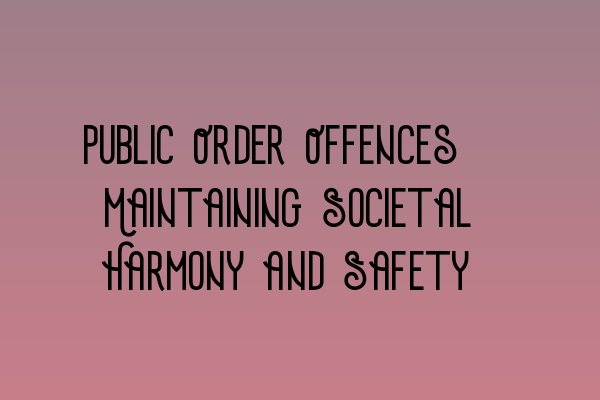Public Order Offences: Maintaining Societal Harmony and Safety
In the realm of criminal law, public order offences play a vital role in upholding societal harmony and safety. These offences are specifically designed to maintain order, protect public well-being, and prevent disruption in the community.
The Significance of Public Order Offences
Public order offences serve as a safeguard against behaviors that may threaten the peace and stability of a community. They encompass a wide range of conduct, such as disorderly behavior, public disturbance, and provocation of violence.
One key example of a public order offence is disorderly conduct. This offense encompasses actions that cause alarm, distress, or harassment to others in a public space. It is important to note that even minor actions, such as using threatening or abusive language, can amount to disorderly conduct.
Another common public order offence is riot. A riot occurs when three or more individuals engage in violent or disorderly behavior that poses a threat to public safety. Riots can lead to significant property damage, injuries, and the disruption of public services.
The Legal Framework of Public Order Offences
To effectively combat public order offences, it is crucial to have a comprehensive legal framework in place. In the UK, public order offences are governed by various statutes, including the Public Order Act 1986 and the Criminal Justice and Public Order Act 1994.
These statutes outline the specific elements of each offence, the penalties associated with them, and the necessary evidential requirements. A thorough understanding of these laws is essential for legal professionals who specialize in criminal law.
Challenges in Prosecuting Public Order Offences
Prosecuting public order offences can be a complex task due to various challenges. Firstly, collecting sufficient evidence to prove the guilt of the accused can be difficult, especially in cases where multiple individuals are involved in the offending behavior.
Furthermore, the interpretation of what constitutes disorderly conduct or a riot can be subjective. Professionals in the legal field must carefully examine the circumstances of each case and ensure that the evidence aligns with the legal definitions set out in the relevant statutes.
The Role of Legal Professionals in Public Order Offences
Legal professionals, such as solicitors and barristers, play a crucial role in the prosecution or defense of individuals charged with public order offences. They provide legal advice, gather evidence, and present compelling arguments in court.
For those aspiring to excel in criminal law, it is essential to have a strong foundation in relevant legal knowledge and skills. Preparing for the Solicitors Qualifying Examination (SQE) by undertaking SQE 1 practice exams and participating in SQE 1 practice mocks can greatly enhance your chances of success.
Conclusion
Public order offences are an integral part of maintaining societal harmony and safety. They serve as a deterrent against disruptive behavior and protect the well-being of communities. Prosecuting or defending individuals charged with public order offences requires a solid understanding of the legal framework and excellent advocacy skills.
For legal professionals, continuous learning and preparation are key. Explore our SQE 2 preparation courses and SQE 1 preparation courses to deepen your knowledge and increase your chances of success in this challenging yet rewarding field.
